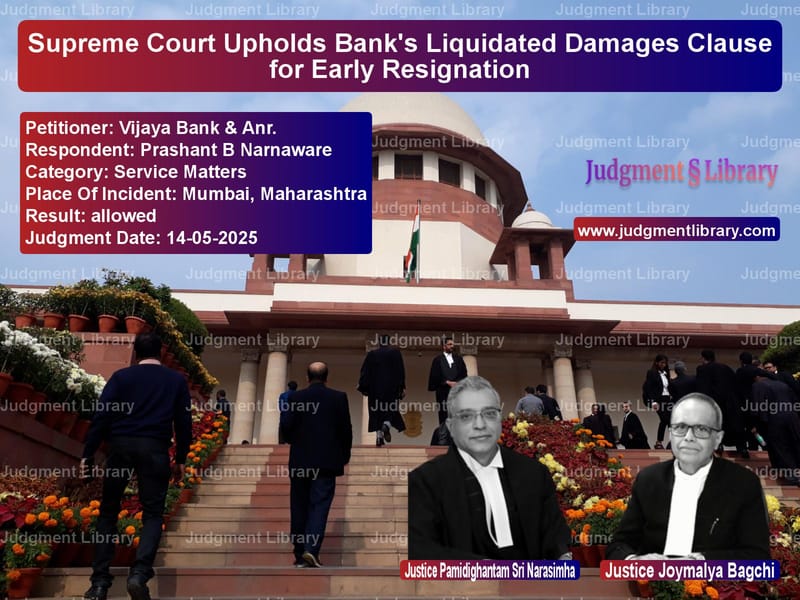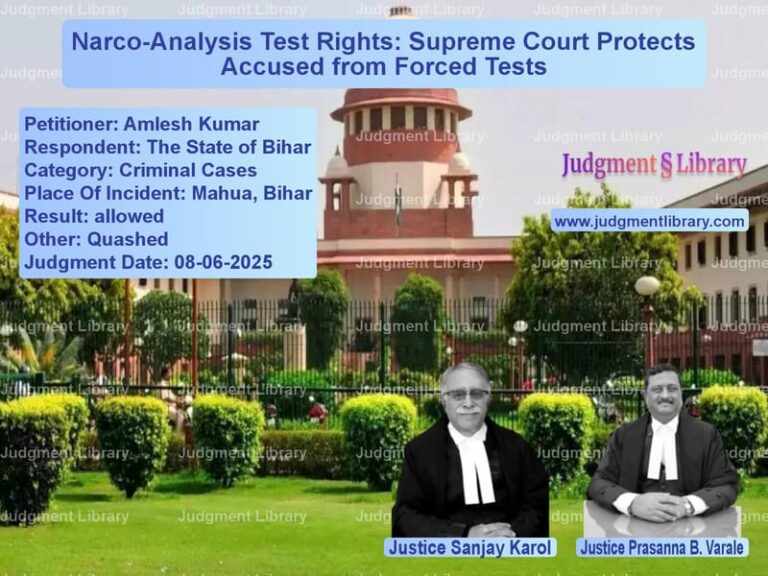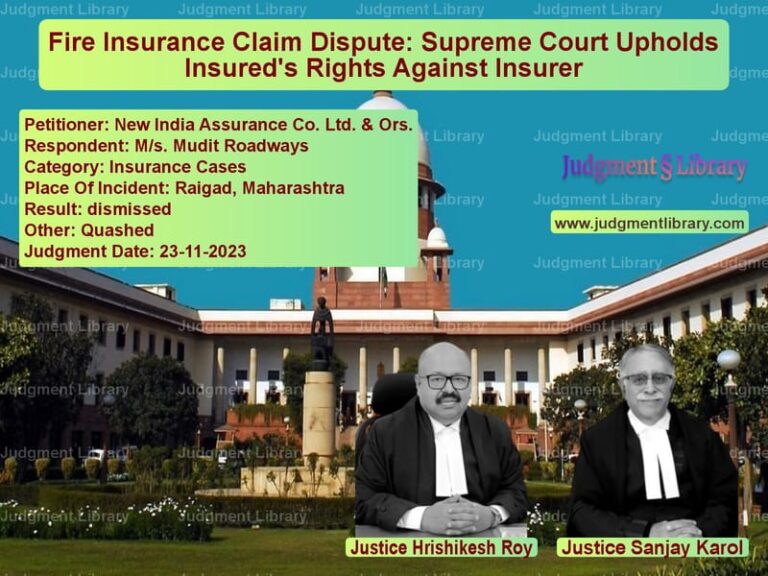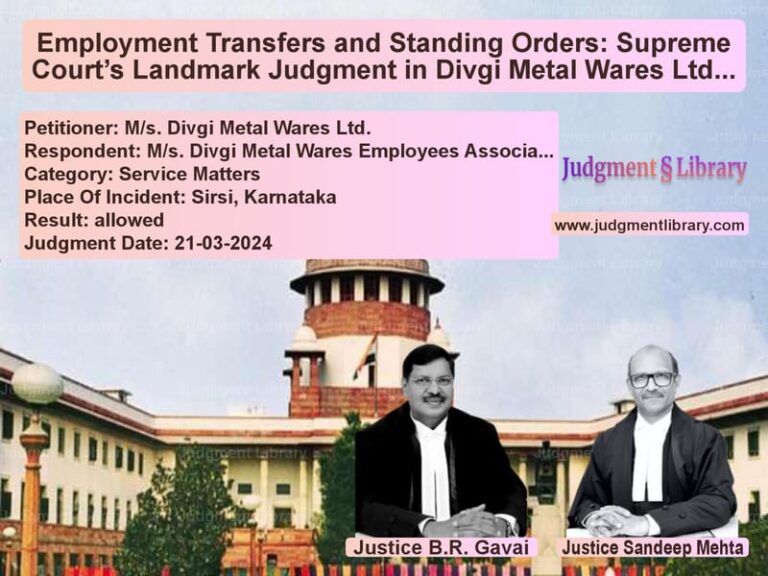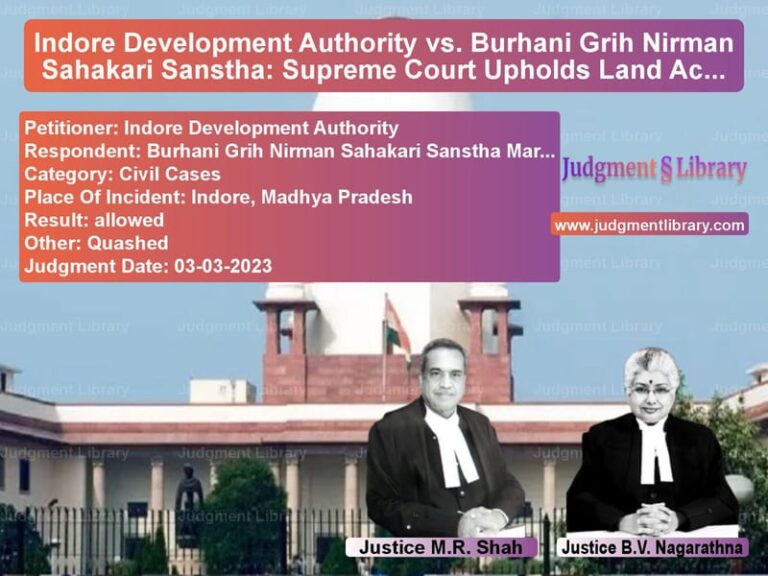Supreme Court Upholds Bank’s Liquidated Damages Clause for Early Resignation
In a landmark judgment that clarifies the legal position on employment bonds and restrictive covenants, the Supreme Court of India has upheld the validity of a clause in an employment contract requiring employees to pay liquidated damages if they resign before completing a specified period. The case involved Vijaya Bank and one of its senior managers, Prashant B Narnaware, who challenged a clause in his appointment letter that required him to pay Rs. 2 lakhs if he left the bank’s service before completing three years. The Court’s ruling provides significant clarity on the interpretation of Section 27 of the Indian Contract Act (restraint of trade) and Section 23 (agreements opposed to public policy) in the context of employment contracts, particularly in the public sector. The judgment balances the rights of employees against the legitimate business interests of employers in retaining trained staff and avoiding the costs of frequent recruitment.
The Case Background
The legal dispute originated in 2006 when Vijaya Bank issued a recruitment notification for appointing 349 officers in different grades. Clause 9(w) of the recruitment notification clearly stated: “Selected candidates are required to execute an indemnity bond of Rs.2.00 Lakh (Rupees Two Lakh only) indemnifying that they will pay an amount of Rs.2.00 lakh to the Bank if they leave the service before completion of 3 years.” The respondent, Prashant B Narnaware, who was already working with the bank as a Manager in Middle Management Scale-II, applied for the post of Senior Manager-Cost Accountant with full knowledge of this condition and was selected for the position.
On August 7, 2007, the respondent received an appointment letter that contained clause 11(k), which stated: “You are required to serve the Bank for a minimum period of 3 years from the date of joining the bank and should execute an indemnity bond for Rs.2.00 lakhs. The said amount has to be paid by you in case you resign from the services of the bank before completion of stipulated minimum period of 3 years. For this purpose, you have to bring a blank non-judicial stamp paper of Rs.100/- procured in the State of your posting.” The respondent accepted these terms, voluntarily resigned from his previous position, and joined as Senior Manager, MMG-III on September 28, 2007, after executing the required indemnity bond.
However, on July 17, 2009 – before completing three years of service – the respondent tendered his resignation to join IDBI Bank. His resignation was accepted, and on October 16, 2009, he paid the sum of Rs. 2 lakhs to Vijaya Bank under protest. Subsequently, he filed a writ petition before the High Court challenging clause 9(w) of the recruitment notification and clause 11(k) of the appointment letter, arguing that they violated Articles 14 and 19(1)(g) of the Constitution of India and Sections 23 and 27 of the Indian Contract Act, 1872.
The Legal Challenge
The respondent’s counsel, Mr. Rahul Chitnis, presented several arguments against the validity of the liquidated damages clause. “Mr. Chitnis has vehemently argued the clause is part of a standard form contract and his client was compelled to sign on dotted lines. If he did not do so, he would have to forsake career advancement. The terms of the contract were imposed on him through an unequal bargaining mechanism. Clause 11 (k) being an unreasonable, onerous and ex-proportionate measure resulting in unjust enrichment for the appellant-bank is opposed to public policy.” He emphasized that the respondent had complied with the condition under protest and should not be precluded from challenging it as violative of fundamental rights and public policy.
The appellant bank, represented by Mr. Rajesh Kr. Gautam, defended the clause as a legitimate business requirement. The bank explained the financial and operational hardships it would suffer due to premature resignations: “The Indemnity Bond obtained by the Bank was done so with a view to secure the interests of the Bank and to place adequate safeguards against premature resignations-tendered by employees. In the usual course, appointments are into service of the Bank after a detailed and elaborate process of recruitment and the Banks interest would be seriously prejudiced in the event premature resignations are tendered which would render the entire recruitment process redundant. That apart the Bank would also suffer the consequences of the loss in continuance of the said post which would necessitate alternative arrangements and restructuring to ensure smooth functioning of day to day business activities. That apart, the bank would have to initiate a fresh process of recruitment which would be time consuming and also expensive.”
The Supreme Court’s Analysis on Restraint of Trade
The Supreme Court bench comprising Justice Pamidighantam Sri Narasimha and Justice Joymalya Bagchi conducted a detailed analysis of whether clause 11(k) amounted to restraint of trade under Section 27 of the Contract Act. Section 27 states that every agreement which restrains a person from exercising a lawful profession, trade or business is void to that extent, with a sole exception for the sale of goodwill of a business.
Read also: https://judgmentlibrary.com/pension-rights-for-absorbed-employees-supreme-court-landmark-ruling/
The Court referred to the landmark judgment in Niranjan Shankar Golikari v. Century Spinning and Manufacturing Co., which made a crucial distinction between restrictive covenants operating during the subsistence of an employment contract and those operating after its termination. The Court quoted: “17. The result of the above discussion is that considerations against restrictive covenants are different in cases where the restriction is to apply during the period after the termination of the contract than those in cases where it is to operate during the period of the contract. Negative covenants operative during the period of the contract of employment when the employee is bound to serve his employer exclusively are generally not regarded as restraint of trade and therefore do not fall under Section 27 of the Contract Act. A negative covenant that the employee would not engage himself in a trade or business or would not get himself employed by any other master for whom he would perform similar or substantially similar duties is not therefore a restraint of trade unless the contract as aforesaid is unconscionable or excessively harsh or unreasonable or one-sided.”
This principle was reiterated in Superintendence Company (P) Ltd. v. Krishan Murgai, where Justice A.P. Sen held: “18. Agreements of service, containing a negative covenant preventing the employee from working elsewhere during the term covered by the agreement, are not void under Section 27 of the Contract Act, on the ground that they are in restraint of trade. Such agreements are enforceable. The reason is obvious. The doctrine of restraint of trade never applies during the continuance of a contract of employment; it applies only when the contract comes to an end.”
Applying these principles to the present case, the Supreme Court observed: “A plain reading of clause 11 (k) shows restraint was imposed on the respondent to work for a minimum term i.e. three years and in default to pay liquidated damages of Rs. 2 Lakhs. The clause sought to impose a restriction on the respondent’s option to resign and thereby perpetuated the employment contract for a specified term. The object of the restrictive covenant was in furtherance of the employment contract and not to restrain future employment. Hence, it cannot be said to be violative of Section 27 of the Contract Act.”
The Court’s Examination of Public Policy
The Court then examined whether the clause was opposed to public policy under Section 23 of the Contract Act. The Court referred to the seminal case of Central Inland Water Transport Corporation Ltd. v. Brojo Nath Ganguly, which dealt with standard form employment contracts in the context of unequal bargaining power. The Court quoted: “91………………the majority of such contracts are in a standard or prescribed form or consist of a set of rules. They are not contracts between individuals containing terms meant for those individuals alone. Contracts in prescribed or standard forms or which embody a set of rules as part of the contract are entered into by the party with superior bargaining power with a large number of persons who have far less bargaining power or no bargaining power at all. Such contracts which affect a large number of persons or a group or groups of persons, if they are unconscionable, unfair and unreasonable, are injurious to the public interest.”
The Court summarized the legal principles regarding standard form employment contracts: “(i) Standard form employment contracts prima facie evidence unequal bargaining power. (ii) Whenever the weaker party to such a contract pleads undue influence/coercion or alleges that the contract or any term thereof is opposed to public policy, the Court shall examine such plea keeping in mind the unequal status of the parties and the context in which the contractual obligations were created. (iii) The onus to prove that a restrictive covenant in an employment contract is not in restraint of lawful employment or is not opposed to public policy, is on the covenantee i.e. the employer and not on the employee.”
The Court elaborated on the concept of public policy, quoting from Brojo Nath Ganguly: “92. The Indian Contract Act does not define the expression ‘public policy’ or ‘opposed to public policy’. From the very nature of things, the expressions ‘public policy’, ‘opposed to public policy’, or ‘contrary to public policy’ are incapable of precise definition. Public policy, however, is not the policy of a particular government. It connotes some matter which concerns the public good and the public interest. The concept of what is for the public good or in the public interest or what would be injurious or harmful to the public good or the public interest has varied from time to time.”
The Court also noted the evolving nature of public policy as recognized in Golikari: “12……The attitude of the courts as regards public policy however has not been inflexible. Decisions on public policy have been subject to change and development with the change in trade and in economic thought and the general principle once applicable to agreements in restraints of trade have been considerably modified by later decisions. The rule now is that restraints whether general or partial may be good if they are reasonable.”
Contextual Analysis of the Clause
The Court conducted a contextual analysis of why the bank had incorporated such a clause. It noted that since the liberalization era of the 1990s, public sector undertakings like Vijaya Bank needed to compete with efficient private players. “To survive in an atmosphere of deregulated free-market, public sector undertakings were required to review and reset policies which increased efficiency and rationalized administrative overheads. Ensuring retention of an efficient and experienced staff contributing to managerial skills was one of the tools inalienable to the interest of such undertakings including the appellant-bank.”
The Court accepted the bank’s justification that the clause was necessary to reduce attrition and improve efficiency. “Viewed from this perspective, the restrictive covenant prescribing a minimum term cannot be said to be unconscionable, unfair or unreasonable and thereby in contravention of public policy.”
Regarding the quantum of liquidated damages, the Court found that Rs. 2 lakhs was not disproportionate given that the respondent was serving in a senior middle managerial grade with a lucrative pay package. “Judged from that perspective, the quantum of liquidated damages was not so high as to render the possibility of resignation illusory. In fact, the appellant had paid the said quantum and resigned from the post.”
The Court distinguished the present case from the BEML case relied upon by the High Court, noting that in BEML, the restrictive covenant not only imposed a minimum term but also placed a clog on future employability. Additionally, the issue of financial loss due to premature resignations had not been considered in that case.
Conclusion and Implications
The Supreme Court’s judgment represents a balanced approach to employment contracts in the modern economic landscape. While recognizing the potential for unequal bargaining power in standard form contracts, the Court has also acknowledged the legitimate business interests of employers, particularly public sector undertakings operating in a competitive environment.
The judgment clarifies that restrictive covenants operating during the subsistence of an employment contract do not automatically amount to restraint of trade under Section 27 of the Contract Act. Such clauses need to be examined in their specific context, considering factors such as the nature of the employment, the justification provided by the employer, and the reasonableness of the terms.
For employees, the judgment serves as a reminder to carefully review employment terms before accepting positions, especially those involving bonds or liquidated damages clauses. For employers, particularly in the public sector, it provides legal validation for implementing measures to retain trained staff and recover recruitment costs when employees leave prematurely.
The Court’s recognition of the changing economic landscape and its impact on public policy considerations makes this judgment particularly significant. It demonstrates the judiciary’s willingness to adapt legal principles to contemporary business realities while ensuring that fundamental rights and fairness are not compromised.
In allowing the bank’s appeal and upholding the validity of clause 11(k), the Supreme Court has provided much-needed clarity on the interpretation of restraint of trade and public policy in employment contracts, setting an important precedent for future cases involving similar issues.
Petitioner Name: Vijaya Bank & Anr..Respondent Name: Prashant B Narnaware.Judgment By: Justice Pamidighantam Sri Narasimha, Justice Joymalya Bagchi.Place Of Incident: Mumbai, Maharashtra.Judgment Date: 14-05-2025.Result: allowed.
Don’t miss out on the full details! Download the complete judgment in PDF format below and gain valuable insights instantly!
Download Judgment: vijaya-bank-&-anr.-vs-prashant-b-narnaware-supreme-court-of-india-judgment-dated-14-05-2025.pdf
Directly Download Judgment: Directly download this Judgment
See all petitions in Employment Disputes
See all petitions in Contractual Employment
See all petitions in Public Sector Employees
See all petitions in Termination Cases
See all petitions in Recruitment Policies
See all petitions in Judgment by P.S. Narasimha
See all petitions in Judgment by Joymalya Bagchi
See all petitions in allowed
See all petitions in supreme court of India judgments May 2025
See all petitions in 2025 judgments
See all posts in Service Matters Category
See all allowed petitions in Service Matters Category
See all Dismissed petitions in Service Matters Category
See all partially allowed petitions in Service Matters Category

